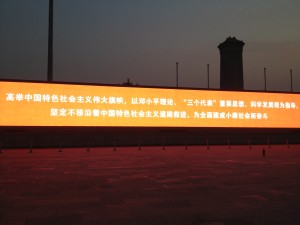The Chinese Communist Party (CCP) has hit some serious speed bumps in the run-up to the 18th National Congress and the highly anticipated transfer of power to Xi Jinping and a new Politburo Standing Committee. The New York Times published an investigative article exposing Premier Wen Jiabao’s estimated family fortune of $2.7 billion, and over the past few days, protests and riots have erupted in the coastal city of Ningbo over a toxic PX (paraxylene) chemical plant.
While both are serious sources of instability, the CCP’s public responses to each have differed in important ways. As for the Wen Jiabao scandal, both the English and Chinese versions of the New York Times website were quickly blocked in Mainland China. All search terms relating to the story, including Wen’s name, have been blocked on popular twitter-like service Sina Weibo and negative references to Wen have remained sanitized from the search engine Baidu. Lawyers supposedly representing the Wen family issued a strong statement condemning the New York Times article and rebutting particular facts, and Foreign Ministry spokesman Hong Lei said the article “blackens China’s name and has ulterior motives.â€
Meanwhile, the official reaction to the Ningbo PX protests has been quite different. Although Public Security Bureau (PSB) riot control squads were out in force using tear gas and batons against the crowd and making arrests, the city quickly folded Sunday evening, declaring that it would stop the PX plant from being built. Online, first person accounts of police brutality and rumors of a Ningbo University student death were suppressed; Sina Weibo even blocked photo-uploads from local Ningbo IP addresses. But the story was not censored to the same degree as the Wen Jiabao scandal. The Ningbo protests are being talked about and photos do circulate on Sina Weibo and elsewhere. The central and local governments want everyone to know that the issue had been resolved: the official announcement was trumpeted nationwide through the People’s Daily and to foreign audiences through the English-language Global Times.
What accounts for this considerable difference? In one case, the news has been thoroughly cleansed from the Internet as to make it impossible to even hear of the news. In the other case, the most egregious examples of state malfeasance have been removed, but the story itself remains. In the case of the Wen Jiabao scandal, the New York Times reporting strikes directly at the legitimacy and authority of the CCP; it goes to the very top. But cases like the Ningbo PX plant can serve as outlets for popular discontent without directly challenging the authority of the CCP.
As Rebecca MacKinnon argues in her recent book “Consent of the Networked,†netizens in China can bring attention to social injustice and can even have an impact on government policies; but ultimately these cases can serve to bolster state legitimacy when the CCP is seen as resolving the problem. There has been a raft of environmental protests recently that have been resolved in similar ways: the Shifang copper plant protests in July, Dalian PX plant protests in August 2011, and the Xiamen PX plant protests in 2007, among many others. The environment is not the only issue handled with relative kid gloves: the Party also emphasizes efforts to fight corruption in cases where the target of an anti-corruption sting is an expendable cadre; food safety is handled much the same (see the death sentences handed out as a result of the melamine tainted-milk scandal). And of course, nationalist protests are skillfully manipulated to further particular narratives and claims to legitimacy.
Hardly any of the actions of the PSB or the Propaganda Department are completely predictable during times of protest and damaging news, but there is a recognizable pattern. The Wen Jiabao and Ningbo cases are indicative of a larger truth: Chinese real-life activists and ordinary netizens are occasionally able to affect real social change in China, but they do so within the confines of acceptable political dialogue that the CCP has already laid out for them.
